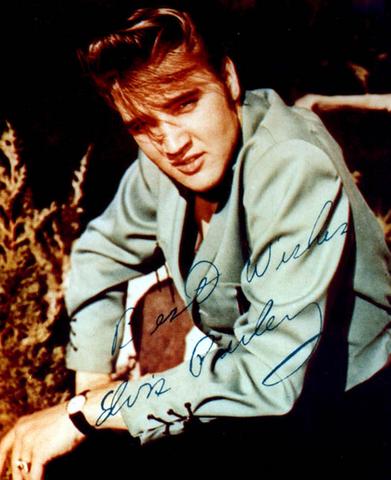What are the odds of Elvis showing up at a party marking his own death -- in Taipei? Stranger things have happened. In August of 1997 he starred "via video" in a concert at the Mid-South Coliseum in Memphis, Tennessee commemorating the 20th anniversary of his passing. The event broke the Coliseum's all-time box office sales record. More routinely, tabloids the world over have reported sightings of the King everywhere from Moscow to Madrid. The fact that none of these reports came from Taiwan only increases the liklihood that someone will eventually bump into him buying red bean cakes at Wellcome.
Do the math. If there's, say, a one-in-a-million chance of Elvis being seen in Taiwan today, and there are 23 million people in Taiwan, then Elvis will be seen on the island 23 times today.
Odds are you'll catch him at Carnegies tonight, where several of his fans will be dressed as their idol, awaiting his arrival. Foremost among them will be Mark Goding, who approached the Carnegie's management about doing something special to honor the King.

PHOTO: REUTERS
"I asked if I could come dressed as Elvis and they said `yeah,' Goding explains. "I asked if it'd be okay if a lot of people came dressed as Elvis and they said `sure.' Then I asked if we could prop up an Elvis cut-out, light candles and offer him buckets of Kentucky Fried Chicken and the like. They seemed to be okay with that, too."
As you might expect, Nudie suits and pompador wigs are hard to come by in Taipei. For his part, Goding plans to make his own by gluing sequins to his clothes and fur to his motorcycle helmet. Just seeing that might be worth standing in line outside Carnegies.
While there are no drink specials planned for the occasion, as Goding points out, if you're dressed like Elvis someone will likely buy you a beer. Of course, the odds of the real Elvis actually appearing are probably much greater than one-in-a-million. Even if he were still alive he'd be 67 years old and might feel out of place at Carnegies.
What am I saying? He'd fit right in.

On April 26, The Lancet published a letter from two doctors at Taichung-based China Medical University Hospital (CMUH) warning that “Taiwan’s Health Care System is on the Brink of Collapse.” The authors said that “Years of policy inaction and mismanagement of resources have led to the National Health Insurance system operating under unsustainable conditions.” The pushback was immediate. Errors in the paper were quickly identified and publicized, to discredit the authors (the hospital apologized). CNA reported that CMUH said the letter described Taiwan in 2021 as having 62 nurses per 10,000 people, when the correct number was 78 nurses per 10,000

As we live longer, our risk of cognitive impairment is increasing. How can we delay the onset of symptoms? Do we have to give up every indulgence or can small changes make a difference? We asked neurologists for tips on how to keep our brains healthy for life. TAKE CARE OF YOUR HEALTH “All of the sensible things that apply to bodily health apply to brain health,” says Suzanne O’Sullivan, a consultant in neurology at the National Hospital for Neurology and Neurosurgery in London, and the author of The Age of Diagnosis. “When you’re 20, you can get away with absolute

May 5 to May 11 What started out as friction between Taiwanese students at Taichung First High School and a Japanese head cook escalated dramatically over the first two weeks of May 1927. It began on April 30 when the cook’s wife knew that lotus starch used in that night’s dinner had rat feces in it, but failed to inform staff until the meal was already prepared. The students believed that her silence was intentional, and filed a complaint. The school’s Japanese administrators sided with the cook’s family, dismissing the students as troublemakers and clamping down on their freedoms — with

As Donald Trump’s executive order in March led to the shuttering of Voice of America (VOA) — the global broadcaster whose roots date back to the fight against Nazi propaganda — he quickly attracted support from figures not used to aligning themselves with any US administration. Trump had ordered the US Agency for Global Media, the federal agency that funds VOA and other groups promoting independent journalism overseas, to be “eliminated to the maximum extent consistent with applicable law.” The decision suddenly halted programming in 49 languages to more than 425 million people. In Moscow, Margarita Simonyan, the hardline editor-in-chief of the